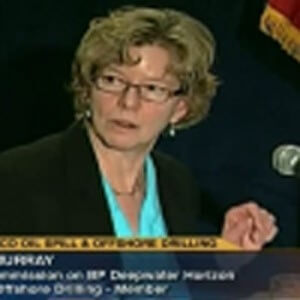News
The following op-ed appeared in the Fall 2010 edition of the The Harvard University Undergraduate Research Journal (THURJ).
From Crude Oil to Olive Oil
Cherry A. Murray, Dean of the Harvard School of Engineering and Applied Sciences; John A. and Elizabeth S. Armstrong Professor of Engineering and Applied Sciences; and Professor of Physics
When the President of the United States calls, you answer.
In June I was appointed to the National Commission on the BP Deepwater Horizon Oil Spill and Offshore Drilling. In fact, as I write this, I am just back from New Orleans, where I boarded a helicopter to visit the sister rig to the one that was destroyed. The twelve-acre structure, about the size of a Navy Destroyer, is located an hour-and-a-half away from the nearest heliport.
All of us on the commission have been asked about our role and ultimate aim. Keeping in mind that I cannot reveal anything specific prior to the report, I can say that we are not looking to design and build a better oil rig or to assess the nature of drilling per se. Instead, we are charged with examining the facts and circumstances behind the root causes of the disaster and developing options for guarding against and mitigating the impact of future oil spills caused by deepwater drilling.
That may then sound like work just for politicians and policy makers. Engineering, however, is at the heart of the process. The Commission needs to solve a mystery: recreating, with incomplete data, how and why the blowout and explosion that sank the rig occurred—when those who know the most about the minutes and moments leading up to the tragedy are no longer with us.
It means, in short, working under massive constraints, or exactly what engineers are trained to do.
The image of engineers and engineering is more accurate than it once was, but it still needs some updating.That may seem odd in an era where Intel commercials joke that their employees are akin to rock stars and when a forthcoming movie about Facebook, a site created in a Harvard dorm room, has immense cultural currency. Shows like Lost and Fringe openly discuss quantum physics, nuclear power, and time travel. And Iron Man’s“superpowers” are very much of this earth.
Of course, engineers design, build,operate, and repair things—often incredibly cool things like iPads and robotic flies and, well, oil rigs. But more often than not, they try to figure out how entire systems work (or don’t work) and how technology interfaces with everyday life.
Engineers have a knack for learning valuable lessons from failure. My predecessor, Dean Venky, liked to say that engineering was first and foremost a way of thinking. About anything. I completely agree.
Take another kind of oil. At the kickoff of the Science and Cooking public lecture series, affiliated with the astoundingly popular new Gen Ed course, chef Ferran Adrià made encapsulated olive oil—little yellow beads that look like caviar.
He mentioned other culinary breakthroughs. Creating hot jellies. Producing raviolis with skin made from the same substance as the sauce. While all were showstoppers, his real love, he said, was the process, or completely rethinking the language and, increasingly,physics of food and cooking.
Adrià held up a glass of water to demonstrate.Looking at it intently, he began to break it down as an experimentalist would, asking about its characteristics, properties, color, and texture. He uses this same technique for all of his fantastic dishes, but he went one step further.
You could, of course, treat water as an animal does, he said, as a basic means to quench thirst. Then again, he added, as his eyes lit up, you could see the water as an immensely complicated system, related to bigger issues like the environment and economics.
Adrià, who said he is a mere cook (ha!), must also be an engineer at heart. The same kind of engineer that we are training at Harvard: those grounded in the liberal arts, deep in a technical subject, but able to stretch across to other areas. The kind of person who looks at something as simple and clear as water and sees an entire universe of possibilities.
Because one day, our students are going to get a similar call to my own—and we want them to be ready.
Cutting-edge science delivered direct to your inbox.
Join the Harvard SEAS mailing list.
